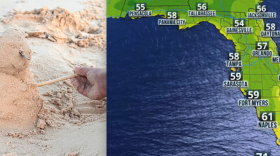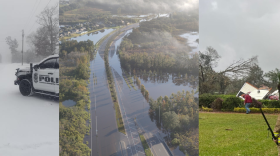Chances are good that you have hundreds, maybe thousands of e-mails stored on remote servers or in your computer. You might have a Facebook page, or a Tumblr or Twitter account. And you might have countless photos in a Flickr album. All that information amounts to a digital profile of sorts, which raises an interesting question: What happens to that online material when we die?
That depends on how you prepare beforehand, says John Romano. Romano and a colleague, Evan Carroll, edit The Digital Beyond, a website that helps users plan what happens to their online content after their death. Romano and Carroll both join Dave Davies for a discussion about online digital legacies.
Romano and Carroll point to blogger Leslie Harpold, who died in 2006, memorably leaving behind a robust online presence. After her death, Harpold's family decided that her blogs should be permanently removed from the Internet. But Harpold had built up a large community of readers and fellow bloggers online, many of whom wanted her work to remain online.
"Many of them tried desperately to contact the family and say, 'Hey, can we place an archive of this on our website?' or 'Hey, can we hold on to this content?' but unfortunately, they chose to keep it private," explains Carroll.
In their new book, Your Digital Afterlife, Romano and Carroll outline ways to protect your online legacy. One tip they offer: Make sure you name a digital executor to handle all of your digital belongings.
"It's very possible that the person who's handling your estate may not be the person who has the technical understanding to take care of your digital things," Romano says. "And there needs to be an important distinction there."
Carroll and Romano also suggest that it might be helpful to create an inventory of online accounts, to ensure your digital executor knows exactly what's most important.
"It doesn't have to be 100 percent exhaustive," Romano says. "I think people might get bogged down or lost or think, 'If I have to write down every online account, I'll be here until tomorrow.' But your inventory is just a list: the name of the object and ways to access that account and your wishes for it."
But be forewarned: Some online terms of service may prevent you from transferring accounts to other people. So it may be good to also have an offline backup for things like photographs or blog entries. Even if you do back things up online, it's still helpful to store the passwords in your digital estate, to be passed on to someone you trust.
"A this point, providing that access [to passwords and usernames] is so much better than the risk of not providing access at all and having that potentially go away altogether," says Carroll. He recommends having a short talk with someone you trust, about your online legacy.
"It's a five-minute conversation," he says. "Just say, 'Listen, just so you know, I put my passwords here and this is how I store them and these are [my accounts], just make sure you take care of those. That's a two-minute conversation you can have with someone that can make them aware of what to do after you're gone."
Interview Highlights
On financial information stored online
Carroll: "It's our recommendation that you realize that anything of a financial matter should be executed according to your legal will as we like to call it -- to provide a differentiation between your digital estate planning. That said, there are a lot of accounts that allow you to spend money and make money online that only exist online. I would recommend that you take steps and store those passwords so that your executor has access to them. Let's say, for instance, you may run an online business and may need to provide your business partner or spouse with that information."
"Accounts like PayPal are really interesting because many of us have our PayPal accounts linked to our checking accounts and it's very easy to transfer money out of those accounts, so it's worth looking at it systematically, and thinking about, 'If so-and-so has access to this, then they might also have access to this,' and really thinking about [the] worst-case scenario of what could happen and safeguarding yourself against that."
On why you should store your online account information separately from your will
Carroll: "A will becomes public record and if your password's in the will and no one's changed the password since it was put there, your password is suddenly exposed to a greater audience."
On when they realized digital legacies were important
Romero: "When my grandfather died, we went to his house and found all sorts of photographs and when my son was born, I realized that all of the photos and videos I was taking were digital. All of it was sitting on my computer."
Carroll: "One of my relatives, an aunt, had asked me to take care of her computer if she passed away, to make sure things that shouldn't be released are kind of put away and things that she might want to share with the family are shared."
On website policies regarding death
Carroll: "There's no one way that all of these service providers act. So Yahoo has their policy, Facebook has their policy, Twitter has their policy and none of the policies are the same -- which makes it really confusing for the average person to figure all of this out."
On editing your online presence throughout life
Carroll: "It's worth considering that anything that's on the Internet and connected to your digital image does have potential to outlast you. For instance, services like Twitter [are] now being archived by the Library of Congress -- presumably that information is going to have a long shelf life. It's worth considering what you put out there and what is put out there about you and making sure that is in line with the image you want to portray."
Copyright 2023 Fresh Air. To see more, visit Fresh Air.






